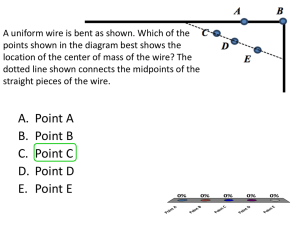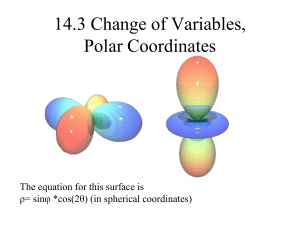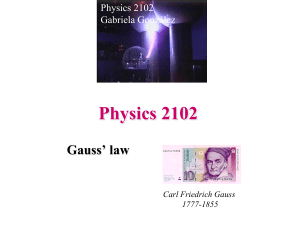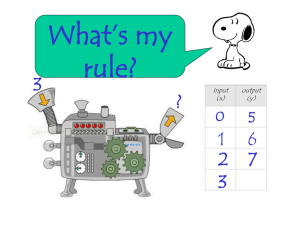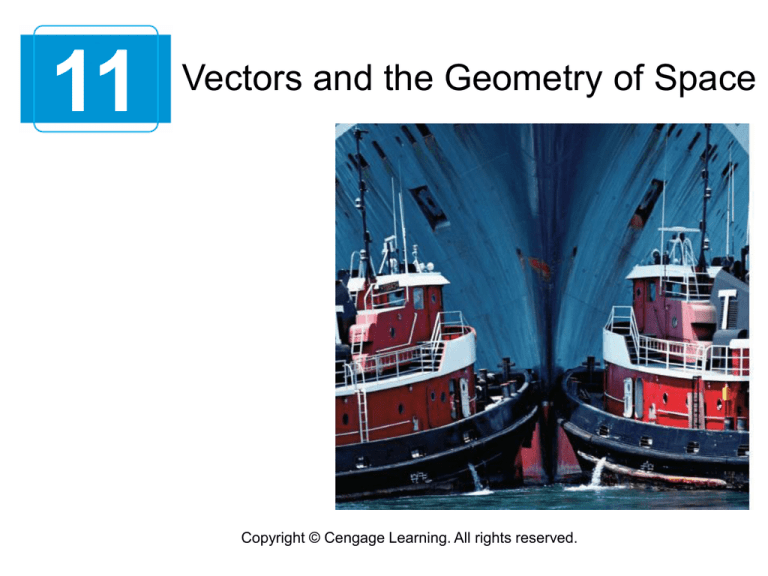
11
Vectors and the Geometry of Space
Copyright © Cengage Learning. All rights reserved.
11.7
Cylindrical and Spherical
Coordinates
Copyright © Cengage Learning. All rights reserved.
Objectives
Use cylindrical coordinates to represent
surfaces in space.
Use spherical coordinates to represent
surfaces in space.
3
Cylindrical Coordinates
4
Cylindrical Coordinates
The cylindrical coordinate system, is an extension of
polar coordinates in the plane to three-dimensional space.
5
Cylindrical Coordinates
To convert from rectangular to cylindrical coordinates (or
vice versa), use the following conversion guidelines for
polar coordinates, as illustrated in Figure 11.66.
Figure 11.66
6
Cylindrical Coordinates
Cylindrical to rectangular:
Rectangular to cylindrical:
The point (0, 0, 0) is called the pole. Moreover, because
the representation of a point in the polar coordinate system
is not unique, it follows that the representation in the
cylindrical coordinate system is also not unique.
7
Example 1 – Converting from Cylindrical to Rectangular Coordinates
Convert the point (r, , z) =
coordinates.
to rectangular
Solution:
Using the cylindrical-to-rectangular
conversion equations produces
Figure 11.67
So, in rectangular coordinates, the point
is (x, y, z) =
as shown in Figure 11.67.
8
Cylindrical Coordinates
Cylindrical coordinates are especially convenient for
representing cylindrical surfaces and surfaces of revolution
with the z-axis as the axis of symmetry, as shown in
Figure 11.69.
Figure 11.69
9
Cylindrical Coordinates
Vertical planes containing the z-axis and horizontal planes
also have simple cylindrical coordinate equations, as
shown in Figure 11.70.
Figure 11.70
10
Spherical Coordinates
11
Spherical Coordinates
In the spherical coordinate system, each point is
represented by an ordered triple: the first coordinate is a
distance, and the second and third coordinates are angles.
This system is similar to the latitude-longitude system used
to identify points on the surface of Earth.
12
Spherical Coordinates
For example, the point on the
surface of Earth whose latitude
is 40°North (of the equator) and
whose longitude is 80° West
(of the prime meridian) is shown
in Figure 11.74. Assuming that
the Earth is spherical and has a
radius of 4000 miles, you would
label this point as
Figure 11.74
13
Spherical Coordinates
14
Spherical Coordinates
The relationship between rectangular
and spherical coordinates is illustrated in
Figure 11.75. To convert from one system
to the other, use the following.
Spherical to rectangular:
Rectangular to spherical:
Figure 11.75
15
Spherical Coordinates
To change coordinates between the cylindrical and
spherical systems, use the following.
Spherical to cylindrical (r ≥ 0):
Cylindrical to spherical (r ≥ 0):
16
Spherical Coordinates
The spherical coordinate system is useful primarily for
surfaces in space that have a point or center of symmetry.
For example, Figure 11.76 shows three surfaces with
simple spherical equations.
Figure 11.76
17
Example 5 – Rectangular-to-Spherical Conversion
Find an equation in spherical coordinates for the surface
represented by each rectangular equation.
a. Cone: x2 + y2 = z2
b. Sphere: x2 + y2 + z2 – 4z = 0
Solution:
a. Making the appropriate replacements for x, y, and z in
the given equation yields the following.
18
Example 5 – Solution
cont’d
The equation Φ = π/4 represents the upper half-cone, and
the equation Φ = 3π/4 represents the lower half-cone.
19
Example 5 – Solution
b. Because
and
equation has the following spherical form.
cont’d
the given
Temporarily discarding the possibility that ρ = 0, you have
the spherical equation
20
Example 5 – Solution
cont’d
Note that the solution set for this equation includes a point
for which ρ = 0, so nothing is lost by discarding the factor ρ.
The sphere represented by the equation ρ = 4cos Φ
is shown in Figure 11.77.
Figure 11.77
21



